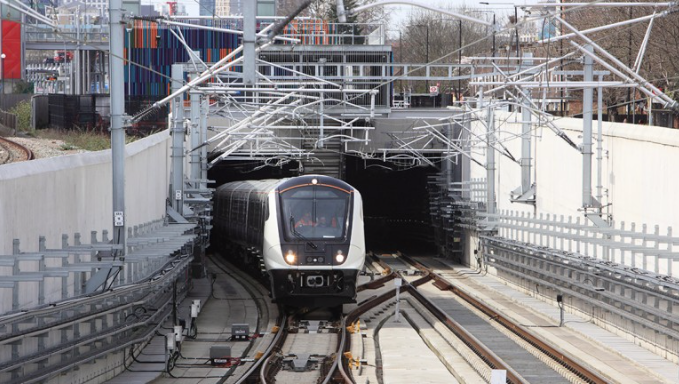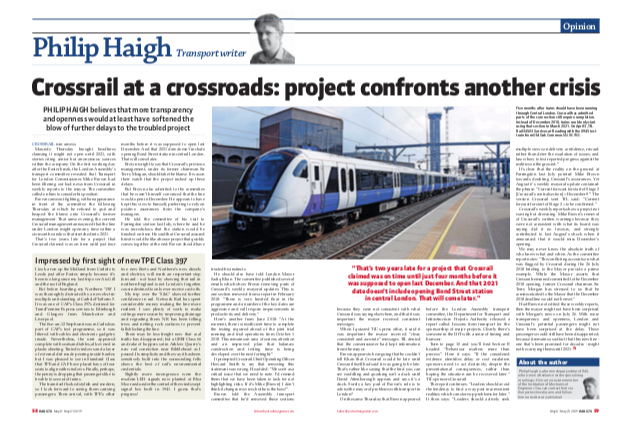Crossrail is in a mess.
Maundy Thursday 2019 came with headlines claiming that Crossrail might not open until 2021. Stories citing senior but anonymous sources within the company. On the first working day after Easter, the London Assembly’s transport committee revealed that TfL Commissioner Mike Brown had been filtering bad news from Crossrail in weekly reports to the mayor. The committee called on him to consider his position.
Brown came out fighting with an appearance the following Thursday in front of the committee. He refused to quit and heaped the blame onto Crossrail’s former management. That evening the current Crossrail management announced that the line might open any time within a six-month window into 2021. That’s two years late.
Crossrail is two years late
Two years late for a project that Crossrail claimed was on-time until four months before its planned December 2018 opening. And 2021 doesn’t include Bond Street station in Central London. It will open later.

Brown is right to say that Crossrail’s previous management, under its former chairman, Sir Terry Morgan, should take the blame. Morgan’s team was in charge when Crossrail racked up these delays. But Brown also said that he wasn’t himself convinced Crossrail would open in December. He appears to have kept this view to himself, preferring to rely on positive assurances from the company’s managers.
Brown told the committee about his visit to Farringdon station in July 2018. He said that he was incredulous that the station would be finished on time. Brown said that Crossrail assured him it would be like a house project that quickly comes together at the end. Brown should have trusted his instincts.
Telling London’s mayor
He should also have told London Mayor Sadiq Khan. The committee published several emails which show Brown removing parts of Crossrail’s weekly mayoral updates. This is one section removed from a report in February 2018: “There is very limited float in the programme and a number of the key dates are aggressive and will require improvements in productivity and delivery”.
Here’s another from June: “At the moment, there is insufficient time to complete the testing required ahead of the joint trial running and trial operations from 1 October 2018. This remains an area of serious attention and an improved plan that balances construction and testing time is being developed over the next fortnight”.
It prompted Crossrail Chief Operating Officer Howard Smith to say that removing this statement was wrong. He added: “We see it as a critical issue that we need to note. I’d remind them that we have been taken to task for not highlighting risks. If it’s Mike [Brown] I don’t think it changes my view but he is the boss!”.
Brown said that he’d removed these sections because they were not consistent with Crossrail’s messages elsewhere. He said that it was important that messages to the mayor were consistent. TfL’s press office told me that it was important that messages to the mayor were “clear, consistent and accurate”. TfL denied that the commissioner had kept information from the mayor.
When a duck really is a duck
Brown appears to be arguing that he couldn’t tell Khan that Crossrail would be late until Crossrail had said it was going to be late. That’s rather like saying that the bird you can see waddling and quacking isn’t a duck until David Attenborough appears and says it’s a duck. Surely a key part of Brown’s role is to advise the mayor of problems with transport in London?
On the day that Brown appeared before the committee, the Department for Transport and Infrastructure Projects Authority released a report called Lessons from transport for the sponsorship of major projects. Clearly there’s someone in the DfT with a sense of timing and humour.
Turn to page 10 and you’ll find Section B headed “Behaviour matters more than process”. Here it says: “If the considered evidence identifies delay or cost escalation sponsors need to act decisively, despite the presentational consequences, rather than hoping the situation can be recovered later”. TfL sponsors Crossrail.
It continues: “Leaders should avoid the tendency to find a way past inconvenient realities which can store up problems for later”. The report adds: “Leaders should actively seek multiple views on delivery confidence, reward rather than deter the escalation of issues, and know how to test reported progress against the realities on the ground”.
It’s clear that the reality on the ground at Farringdon last July pointed Mike Brown towards doubting Crossrail’s assurances. Yet August 6’s weekly mayoral update contained the phrase: “Current forecast for start of Stage 3 [Crossrail’s central section] = December 9th”. The version Crossrail sent TfL said: “ Current forecast for start of Stage 3 = to be confirmed”.
Crossrail not waving but drowning
Crossrail’s weekly reports show a project not waving but drowning. Mike Brown’s removal of Crossrail’s written warnings because they were not consistent with what its board was saying did it no favours. It strongly contributed to last August’s shock when it announced that it would miss December’s opening.
We may never know the absolute truth of who knew what and when. The committee report notes: “The conflicting accounts on what was flagged by Crossrail during the 26 July 2018 briefing to the Mayor provide a prime example.
“While the Mayor asserts that Crossrail remained committed to the December 2018 opening, former Crossrail chair Sir Terry Morgan has stressed to us that he communicated to the Mayor that the December 2018 deadline would not be met.”
Had Brown not edited those weekly reports then the mayor might not have been surprised with Morgan’s news on July 26. With more transparency and openness, there would have been no surprise for London and Crossrail’s potential passengers. Disappointed but not surprised because the sad fact remains that this new line, one that’s been promised for decades, might not open until 2021.
This article first appeared in RAIL 878, published on May 8 2019.
